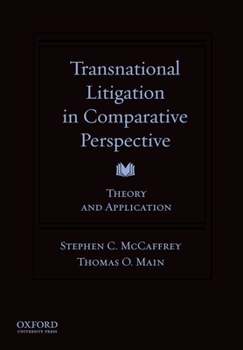Transnational Litigation in Comparative Perspective: Theory and Application
Transnational Litigation in Comparative Perspective: Theory and Application is the only casebook that examines the principal issues in transnational litigation from a comparative perspective. Each chapter focuses on a particular core problem that all legal systems must address. The first half
of each chapter is devoted to exploring the theoretical context of the issue, thereby enabling students to appreciate the complexity of the problem and to see how achieving a resolution requires balancing competing interests. The second part of each chapter then focuses on how different systems deal
with these challenges. Topics covered include protective measures, personal jurisdiction, forum non conveniens, forum selection clauses, state immunity, state doctrine, service of process, gathering evidence abroad, choice of law, and recognition and enforcement of foreign judgments. Distinctive Features
*Uses a comparative approach that better prepares future lawyers for international litigation that may be initiated in countries other than the U.S.
*Offers a hypothetical at the beginning of each chapter to introduce the fundamental issue; the hypotheticals raise questions that are diagnostic rather than prescriptive, leading to many right answers
*Accommodates different types of courses--professors who employ a less theoretical approach can use the hypotheticals to ground class discussions
*Considers issues unique to arbitration as they arise in connection with the various topics studied
of each chapter is devoted to exploring the theoretical context of the issue, thereby enabling students to appreciate the complexity of the problem and to see how achieving a resolution requires balancing competing interests. The second part of each chapter then focuses on how different systems deal
with these challenges. Topics covered include protective measures, personal jurisdiction, forum non conveniens, forum selection clauses, state immunity, state doctrine, service of process, gathering evidence abroad, choice of law, and recognition and enforcement of foreign judgments. Distinctive Features
*Uses a comparative approach that better prepares future lawyers for international litigation that may be initiated in countries other than the U.S.
*Offers a hypothetical at the beginning of each chapter to introduce the fundamental issue; the hypotheticals raise questions that are diagnostic rather than prescriptive, leading to many right answers
*Accommodates different types of courses--professors who employ a less theoretical approach can use the hypotheticals to ground class discussions
*Considers issues unique to arbitration as they arise in connection with the various topics studied
Format:Hardcover
Language:English
ISBN:0195309049
ISBN13:9780195309041
Release Date:April 2009
Publisher:Academic
Length:744 Pages
Weight:1.65 lbs.
Dimensions:1.5" x 7.0" x 9.9"
Based on Your Recent Browsing
Customer Reviews
5 customer ratings | 5 reviews
There are currently no reviews. Be the first to review this work.





















